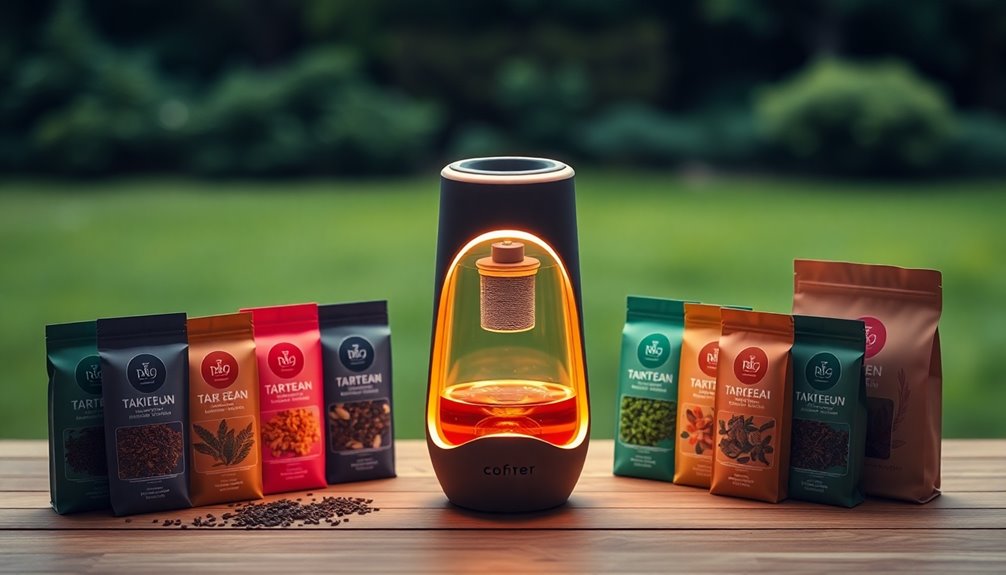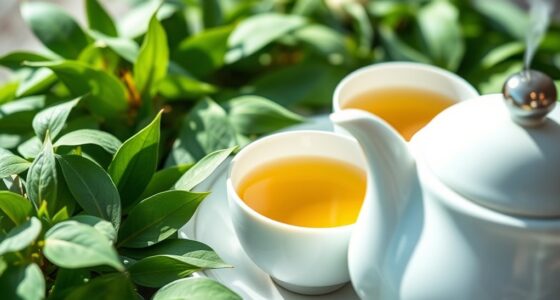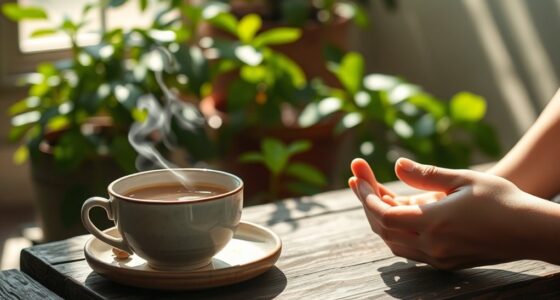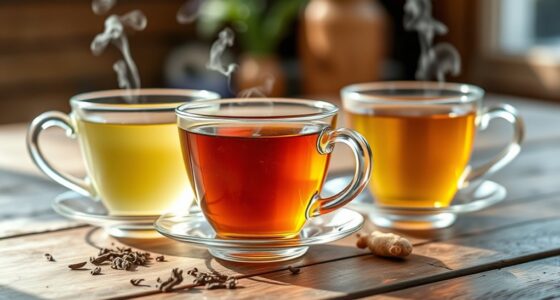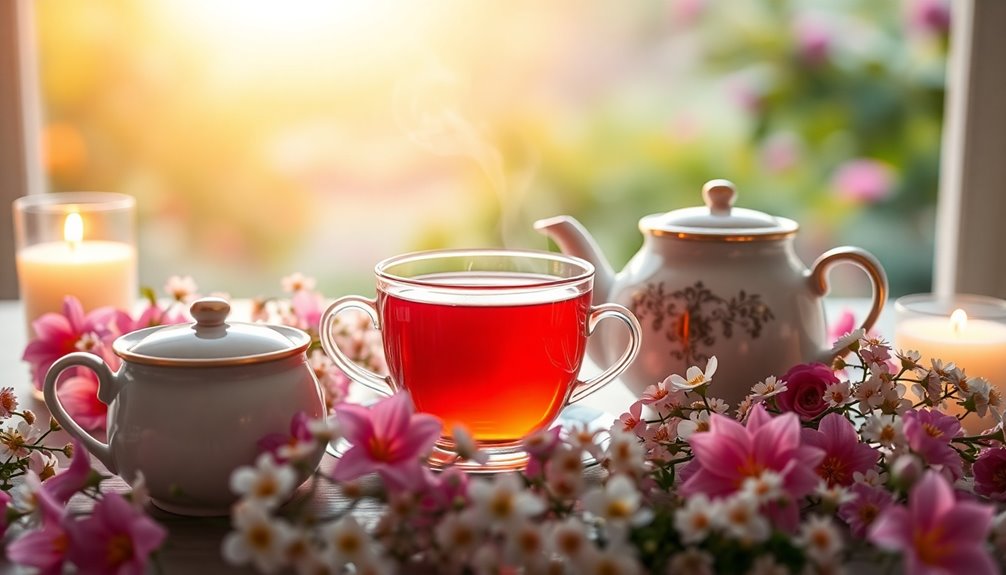If you're looking for calming teas to ease your anxious mind, you've got some tasty options! Chamomile tea works wonders for relaxation, helping you unwind while boosting your mood. Lavender tea not only smells fabulous, but it also improves your sleep quality and soothes your spirit. Passionflower tea is another star, easing anxiety and making bedtime a breeze. You might also enjoy lemon balm for its stress-busting benefits. These herbal teas are caffeine-free, so you won't feel jittery after sipping! Curious to know how you can enjoy these teas even more? Let's explore that together!
Key Takeaways
- Chamomile tea is renowned for its soothing properties, promoting relaxation and potentially enhancing serotonin and melatonin levels.
- Lavender tea helps stabilize mood and improve sleep quality, making it a great option for anxiety relief.
- Passionflower tea is effective for calming the nervous system and enhancing sleep quality, ideal for anxious minds.
- Lemon balm tea is known for its ability to alleviate anxiety and sleep disturbances, providing a calming effect.
- Herbal blends combining chamomile, lavender, and valerian root can offer deeper relaxation and improved sleep quality for those experiencing anxiety.
Introduction
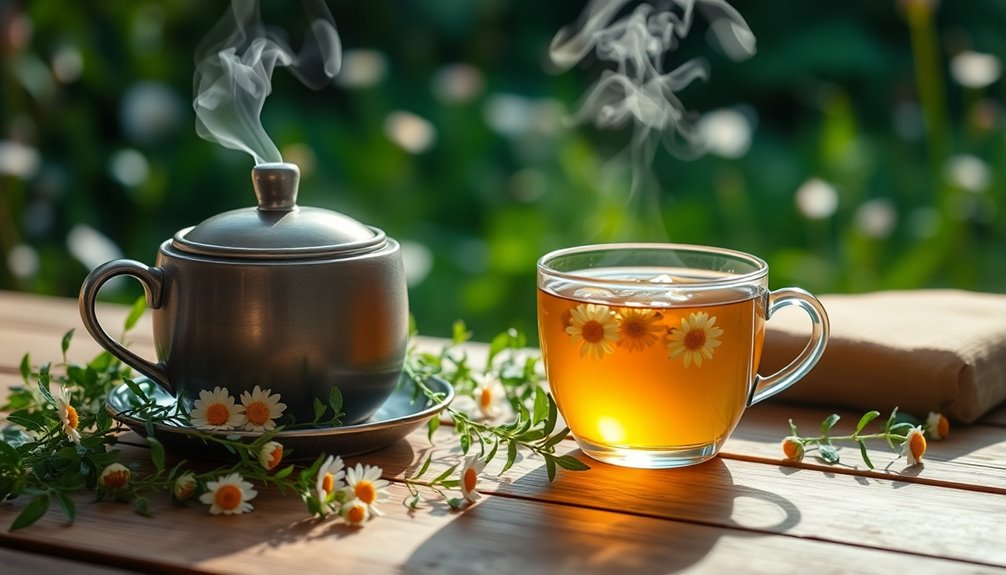
In today's fast-paced world, anxiety is a common struggle for many people. You might find yourself feeling overwhelmed or restless at times, and that's completely okay! One wonderful way to help ease these feelings is by sipping on calming herbal teas. These soothing drinks can promote relaxation and give you some much-needed stress relief.
Chamomile tea is a favorite for its gentle properties, which can help calm your mind and body. It may even boost serotonin and melatonin, helping you feel more at ease. Additionally, studies indicate that certain scents can reduce cortisol levels, a stress hormone, enhancing the overall calming experience. Moreover, certain essential oils like lavender oil can be used in conjunction with herbal teas to further promote relaxation.
Then there's lavender tea, known for its lovely aroma and mood-stabilizing effects. It's great for reducing anxiety and can improve your sleep quality, too!
Don't forget about green tea! Unlike other caffeinated drinks, it contains L-theanine, which helps you feel calm without the jitters.
And if you're looking for another option, passionflower tea has been used for ages to enhance sleep quality and ease anxiety. Additionally, many herbal teas, such as chamomile and lavender, are known for their calming effects that can significantly contribute to relaxation.
Tea's Historical Calming Use
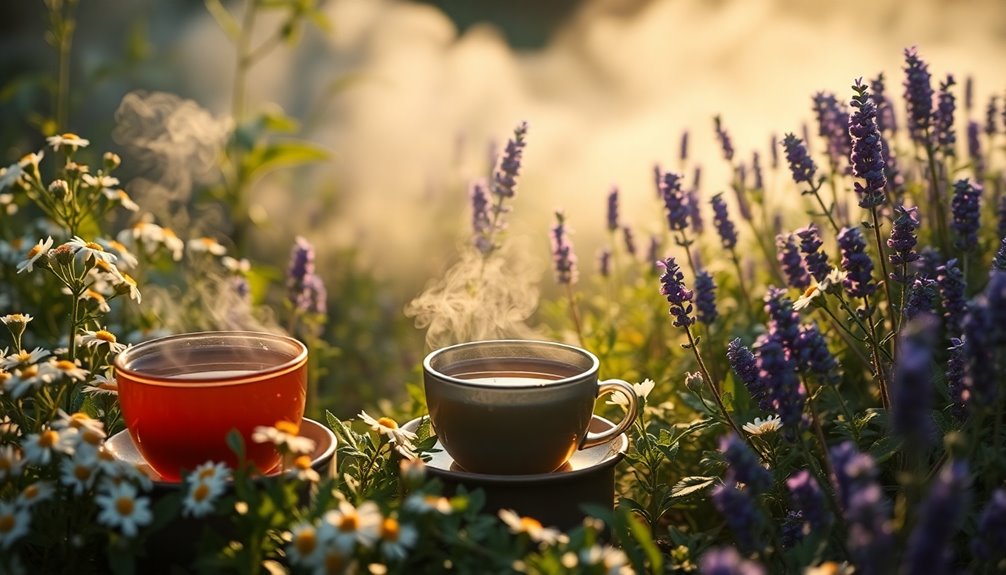
Throughout history, tea has served as a natural remedy for stress and anxiety across various cultures. You might be surprised to learn that many people turned to herbal teas like chamomile and lavender for their calming effects. These teas have soothing properties that have been cherished in traditional medicine for centuries. In fact, the use of herbal teas for relaxation is deeply rooted in many cultures and can be traced back thousands of years. Moreover, studies have shown that certain herbal teas, such as chamomile tea, can significantly improve mood stability. Additionally, incorporating aromatherapy with herbal teas can enhance the overall experience of relaxation.
Tea has a historical significance that goes beyond just drinking it. It was often enjoyed during rituals and social gatherings, where folks would come together to relax and practice mindfulness. In countries like China and Japan, tea ceremonies are a beautiful way to promote tranquility and focus, making each sip a delightful experience. Additionally, certain flower teas are known for their calming effects, further enhancing the experience of relaxation.
Unlike caffeinated drinks like coffee, herbal teas were favored for their gentle approach to emotional health and stress reduction. When you sip a warm cup of herbal tea, you can feel the worries of the day melt away.
Tea's Role in Stress Reduction
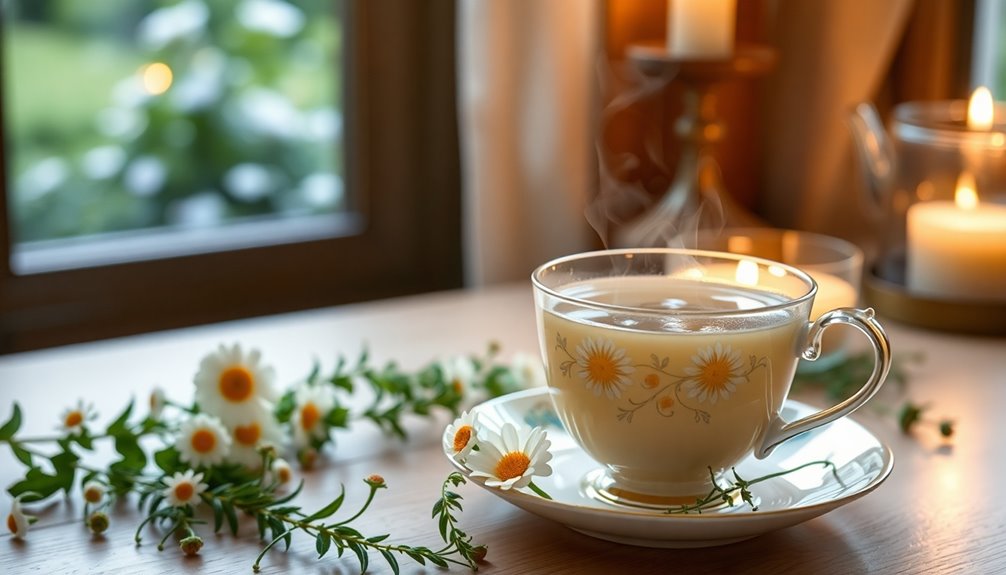
Tea plays a significant role in stress reduction, making it a go-to choice for those seeking relief from anxiety. When you sip on a warm cup of herbal tea, you feel the soothing and calming effects right away. Chamomile tea is a favorite because it can help reduce stress and ease your mind. Peppermint tea is also great, as its refreshing taste helps calm you down and brings a smile to your face.
Drinking herbal tea isn't just about the flavor; it's about the health benefits, too! Many herbal teas contain special compounds that help reduce symptoms of stress and promote better sleep. Plus, they're caffeine-free, so you won't feel jittery like you might after a cup of coffee. Additionally, herbal teas like chamomile and ginger can provide relief from menstrual discomfort, further enhancing their calming effects. Herbal teas are generally caffeine-free, which makes them an excellent choice for those looking to unwind.
The act of preparing and enjoying your tea can be like a little ritual, encouraging mindfulness. When you take a moment to focus on your tea, you can feel anxiety and stress melt away.
Tea Rituals Across Cultures
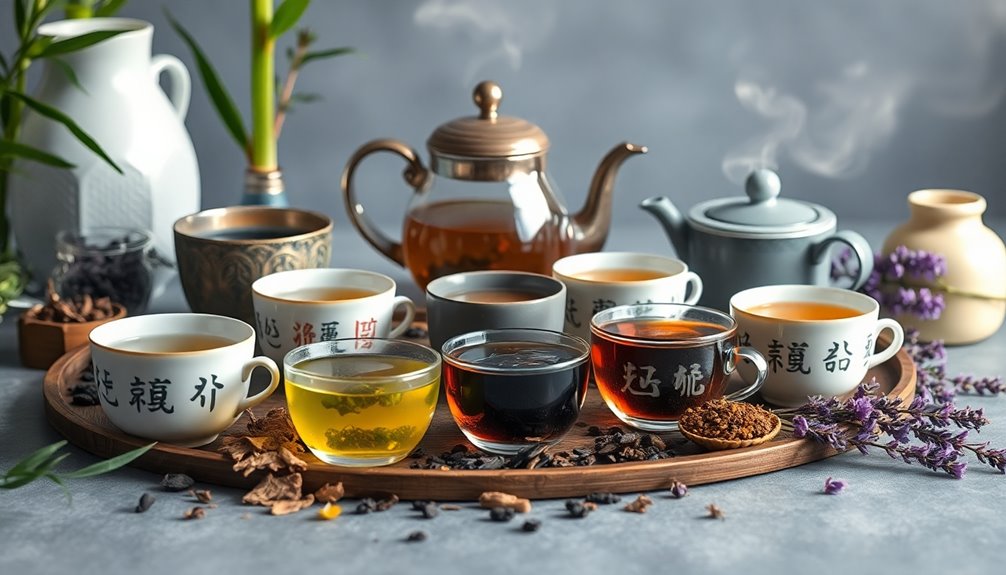
Experiencing the calming effects of tea can be enhanced by exploring the diverse rituals surrounding its preparation and consumption across cultures. Each tea ritual brings its own unique joy and relaxation.
In Japan, the tea ceremony focuses on mindfulness and precision, showing deep respect for the tea and everyone involved. You might enjoy the peaceful atmosphere as you sip green tea, appreciating its flavors.
In China, the Gongfu tea ceremony allows you to brew high-quality tea leaves multiple times, creating amazing flavors with each steeping. Imagine tasting the difference with every cup!
Then there's British afternoon tea, a delightful tradition where people gather to enjoy black tea with light snacks. It's a perfect time for conversation and relaxation.
If you visit Morocco, you'll find mint tea, a symbol of hospitality. Served in beautiful glasses, this refreshing drink combines green tea, fresh mint, and sugar.
Finally, the Indian chai ritual brews black tea with spices and milk, making a cozy drink that you can enjoy throughout the day. Each of these rituals highlights the cultural significance and the calming power of tea. Additionally, the health benefits of herbal tea can further enhance relaxation and well-being during these calming experiences.
Caffeine Content in Calming Teas

Many people often overlook the importance of caffeine content when choosing calming teas. If you want to relax and reduce anxiety, picking the right tea is super important!
Many calming teas, like chamomile tea and peppermint tea, are caffeine-free. This means they won't make you feel jittery or restless. Instead, they help you feel calm and cozy!
Herbal teas are usually the best choice if you're looking to improve sleep, especially in the evening. Chamomile tea, for example, is completely caffeine-free, while peppermint tea also fits into this category.
If you're curious about green tea, it does contain some caffeine, but it has much lower caffeine levels than coffee. Plus, it has L-theanine, which can help you feel relaxed yet alert.
Avoiding higher caffeine levels is key to managing stress and anxiety. When you choose herbal or low-caffeine teas, you can enjoy their soothing effects without worrying about staying up all night.
Practical Applications
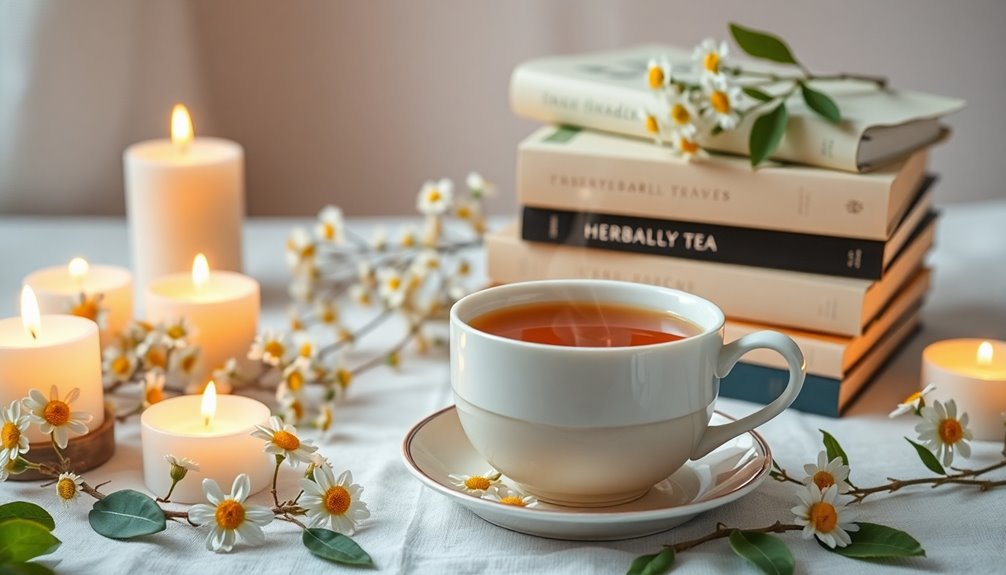
Incorporating calming teas into your daily routine can make a significant difference in managing anxiety and promoting relaxation. Imagine sipping a warm cup of chamomile tea, feeling its calming effects wash over you. Herbal teas like peppermint and lavender are great choices, too. They help reduce stress and bring a sense of peace.
You might also want to try green tea, which is rich in L-theanine. This special ingredient can enhance relaxation and lower stress levels, making it a smart alternative to coffee, which might make your anxiety worse. Additionally, some studies suggest that coffee may improve cognitive function, which can be beneficial for managing stress in moderation. Interestingly, cocoa contains approximately 15 mg of caffeine per ounce, making it a lower-caffeine alternative to coffee.
Creating a mindful tea-drinking ritual can help, too. Take a deep breath while your tea steeps, and allow yourself a moment of zen.
You can even explore different tea blends that mix various herbal teas, like passionflower and valerian root, to improve sleep quality and support your mental health.
Frequently Asked Questions
What Tea Is Best for Calming Anxiety?
When you're seeking calm, consider chamomile for its soothing properties, lavender for mood enhancement, or green tea for stress reduction. Each offers unique benefits that can help ease your anxiety and promote relaxation.
What Tea Relaxes the Brain?
When you're looking to relax your brain, consider sipping chamomile or passionflower tea. Their calming properties can help soothe your mind, promoting relaxation and improving your overall mental clarity and well-being. Enjoy the tranquility!
What Is the Best Drink to Calm Anxiety?
When you're seeking the best drink to calm anxiety, herbal teas like chamomile or peppermint work wonders. Their soothing properties create a comforting ritual that helps you relax and find peace in hectic moments.
What Is the Most Soothing Tea?
When you're looking for the most soothing tea, consider options like chamomile or lavender. They're known for their calming properties, helping you unwind and feel more relaxed after a long day. Give them a try!
Conclusion
So, next time you feel a bit anxious, why not brew a cup of your favorite calming tea? Whether it's chamomile, peppermint, or lavender, each sip can help you relax and feel better. Remember, the warmth of the tea can be like a cozy hug for your mind! So, take a moment, enjoy the soothing flavors, and let your worries drift away. You deserve a little peace and quiet in your busy day!


